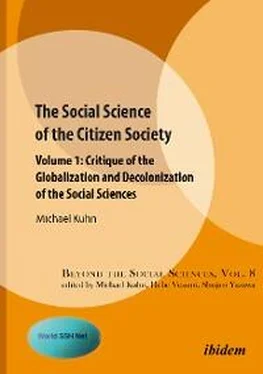3.1 State self-portraits of indigenous knowledge
3.2 Indigenized Knowledge in global discourse
3.3 How the de-colonized social sciences view the world of science—and its ideological harvests
4.The Final Scientific Highlights of the Masterminds of Globalized Post-colonial Thinking
4.1 Imperialisms as a methodological instrument of social science theory-building
4.2 Imperial theories—for morally clean wars
5. Old and New Mistakes and Their Sources: Theoretical Legacies of the Globalization and Decolonization Debates under the Preparatory Work of HistoMat
Introduction: The “Globalization” and “De-colonization” of the Social Sciences 1
Around 50 years after end of World War II, the social sciences next to creating their theories began another round to reflect on themselves. The discourses that the social sciences then conducted around the end of the 20th century across all disciplines and equally worldwide under the title of a “globalization” of the social sciences, countered by a discourse on their “de-colonization” that was as worldwide as it was across disciplines, could not be more paradoxical, if one considers alone the fact that it takes 50 years after the end of the war to discover that the world had become a world of nation states after the colonized part of the world had adapted the very society model of capitalism of the old colonialists and then the alternative society model, called real socialism, had declared to be finished in a very unspectacular way and had also put their societies back to the regime of capitalism.
With these discourses about “globalization” and “de-colonization”, discourses on what their essential tasks and challenges are in a world of capitalist societies, especially when these discourses are discussed in the social sciences around the world and across all social science disciplines, these sciences, thanks to all the paradoxes of these discourses and their theories, provide insights into what makes social science thinking around the world today concerned.
Social sciences call this world of states and market economies “globalization” and at the latest at the beginning of the new century, this discovery of a “globalization” leads to a comprehensive self-critique and social science thinking makes, if one follows the worldwide debates of the social sciences, a discovery and accuses itself of having so far been a “zombie science” in its previous history, because it has closed itself to thinking about the “globalized” social and as a consequence of this self-critique propagates, as social sciences would call it, a “paradigm shift” of its thinking, so to speak a complete revolution of its theory creation. Globalization’ is the keyword that signals the overthrow also in the social science theory production and this ‘globalization’ is—according to the view of the social sciences—not only the hitherto wrongly ignored, all-shaping characteristic of the social, but also the reason for the necessity to fundamentally transform social science thinking itself and to ‘globalize’ the social sciences themselves in order to finally produce theories about the world instead of their previous “Zombi-science.” 2
This self-critical judgment of the social sciences and the “paradigmatic” transformation it heralds raises a few questions about this program of transformation, even before one takes a closer look at this project of a globalized science, because it contains at least two errors of thought and a meaningful confession—bought with a discreet lie—a confession that allows a few insights into the nature of thinking in the social sciences.
To start with the latter: The fact that the social sciences are currently highly busy arguing about the necessity of a “globalization” of thinking is as strange as it is informative, because it confesses that thinking about everything social beyond state-constructed societies does not constitute for social scientific thinking an object of social scientific thinking, i.e., for social scientific thinking all state-constructed societies and the social are identical. For this self-critical confession cannot be without the mistake that today’s discovery of a “globalization” claims that the social was not globally, i.e., worldwide, constructed before the observed “globalization”. Just as if there had not been a “global” social in the period preceding “globalization”—colonialism—the discovery of a “globalized” social only makes sense from the point of view of a thinking, if this thinking equates all state-constructed societies with the nature of society, a discovery because it is beyond state-constructed societies, with which the social sciences obviously deal quasi naturally, for this thinking obviously only with the de-colonization, i.e. only with the worldwide establishment of state-constituted societies, a worldwide social exists, with which to have to deal theoretically social scientific thinking as a new task of the social sciences only discovers when the world is a world of state societies.
Obviously, therefore, the model of state societies had to be implemented worldwide in order for social science thinking to discover the existence of a social world at all. A social world that is not a world of nation-state societies, one must conclude from the current discovery of societies alongside one’s own national society, is not a “global” world for the social sciences. As strange as it may sound, it is only the postcolonial transformation of the world into a world of nation-states that allows social science thinking to discover that there is a world beyond its own national society, so for social science thinking, everything social begins with state societies.
And this, the abstruse insight that sociality should only exist after the world has become a world of nation states, contains on top of it a small, equally paradoxical lie of the social sciences about itself: the social sciences knew and know very well a social world beyond nation-state societies before the de-colonization, i.e., before the transformation of the colonies into the very state societies of the colonizers. Social science thinking had even created a special social science discipline, anthropology, a discipline that was responsible for thinking about the “uncivilized social”, that is, for thinking about everything social that is not nation-state societies, and which, now that the world consists of state societies, has found a new disciplinary task with the establishment of cultural studies. And it is as paradoxical as it is telling that, with the exception of anthropology, which was reserved for thinking about the non-state social and which today, after the worldwide “civilization” of the world as state-constructed societies, puzzles over what its object might be, for the social science thinking of all other social science disciplines a social world was non-existent until it was transformed into a world consisting of nation-state constructed societies, only to then demand the “globalization” of their thinking.
This concept of a “globalization” characterizes this picture of a strange discovery of worldwide existing societies by the social sciences after the creation of a world of nation-state societies, just as if there had not been a world until now, i.e. the discovery of a world consisting of state societies, just as if this, the world as a world of states, was the final completion of the social nature of the world, and offers to social scientific thinking only with this world of states its object of thinking, frees the world so to say from its untheorizable non-social spots. “Globalization”, this worldwide spatial spread of something that neither knows a subject that operates this global spread nor wants to name an object, a something that is spread globally, and a concept that does not reveal which subjects are responsible for the mysterious global spread of this subject—an objectless something, nor for what reasons and for what purposes it spreads, is therefore the appropriate synonym of social science thinking for the discovery of a world, under the condition that it is a world of nation states, because for this thinking the world has finally become, quasi by itself, for this thinking, what it has always had to be as its very nature: Everything social in the world has thus matured quasi naturally towards its nature as citizen societies, has somehow come to itself. That is why the idea of a “globalization” of the social needs neither a subject that pursues this globalization, nor an object that this subject wants to bring about. It is to be imagined with this monstrous concept of a “globalization” that the social as a state constructed social develops quasi naturally into what it has always wanted to be as its very nature.
Читать дальше












